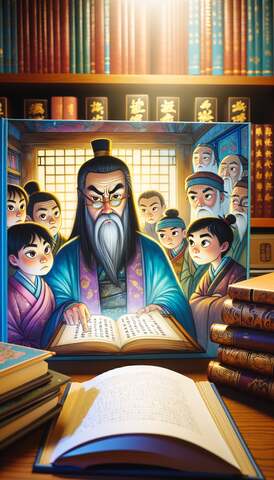
韩愈是唐朝的一个大文人,他懂得很多关于古代文化和各种知识。
他喜欢儒家的思想,并且努力地推广古文。
他是唐宋八大家之一。
和中国其他的读书人一样,韩愈也希望自己能够被朝廷重用,展示自己的才能和抱负。
他在年轻的时候就考中了进士,但是因为他的性格不太适合官场,所以在做官的道路上一直起伏不定,有时候会感到很失落。
有一天,韩愈在他的学生面前训话,他说:“你们要努力学习,只有这样才能够有成就。学问和品德都要好,将来才不会被埋没。”
但是有一个学生质疑地说:“老师,您不要骗我们了!我知道您已经非常有学问了,每天都在看书,连晚上也不休息,点着灯继续看。可是您还是没有被朝廷重用,反而因为您的思想不符合当政者的要求而被排挤。您自己有这样的遭遇,为什么还要我们专心做学问呢?”
韩愈通过这个故事,一方面批评了那些不能善用人才的官员,另一方面也表达了他自己怀才不遇的失落感。
从这个故事中,我们得到了一个成语“焚膏继晷”,意思是说一个人夜以继日地勤奋读书或者工作。
这个成语也可以用来形容人们不眠不休地工作或活动。
Han Yu was a great scholar of the Tang Dynasty. He knew a lot about ancient culture and various knowledge.
He liked Confucianism and worked hard to promote classical literature.
He was one of the Eight Great Masters of the Tang and Song Dynasties.
Like other scholars in China, Han Yu also hoped that he could be appreciated by the court and show his talents and ambitions.
He passed the imperial examination at a young age, but because his personality was not suitable for officialdom, he had an uneven career as an official, sometimes feeling very frustrated.
One day, Han Yu lectured his students, saying, "You must study hard, only then can you achieve something. Both learning and morality should be good, so you will not be buried in the future."
But one student questioned, "Teacher, don't deceive us! I know you are already very learned, reading books every day, even continuing to read with a lamp at night. But you still haven't been appreciated by the court, instead being ostracized because your thoughts do not conform to those of the ruling officials. You have experienced such setbacks yourself, why do you still want us to focus on our studies?"
Through this story, Han Yu criticized those officials who could not make good use of talents on the one hand, and expressed his own sense of frustration at being unable to meet his ambitions on the other.
From this story, we get the idiom 'burning oil to continue studying', which means that a person works or studies diligently day and night.
This idiom can also be used to describe people who work or engage in activities without rest.